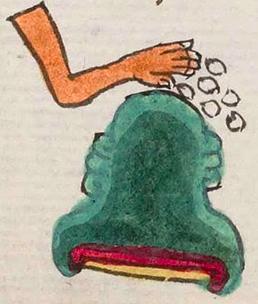Nepopohualco (Mdz25r)
This compound glyph for the place name Nepopoalco has two principal elements. One is the classic hill or mountain (tepetl), but it is silent here, possibly serving as a semantic indicator in place of a locative suffix. This mountain is the classic two-tone green bell shape with horizontal yellow and red stripes near the base and rocky outcroppings on each slope. The other primary element in the glyph is an arm with a hand, coming in from the left above the top of the mountain, seemingly sprinkling small round objects (coins?) that spill down the right side of the mountain. The round objects are left natural/white.
Stephanie Wood
The sprinkling of the coins may be a gesture involving repayment or restitution of funds, or popohua (showing vowel length: pōpōhua). Thus, the place where repayments take place could be at the heart of this place name. But, as Karttunen suggests, any one of several meanings of popohua could be involved. The visual of paying may actually provide the phonetic indicator for another meaning for popohua. Joaquín García Icazbalceta (Nueva colección de documentos para la historia de México, 1889, vol. 2–3, p. 243) says that "Nepopualco" means "contadero" (accountant? or place of accounting?), "porque aquí se contaron los que venían" (because here they counted those who were coming—seemingly referring to various groups of arriving travelers or migrants).
Nepopohualco (with various spellings) is not an uncommon place name. At minimum, there is a Nepopualco, part of Totolapan, in the modern state of Morelos, another Nepopualco in Huejotzingo in the state of Puebla, and one in Ixtacuixtla in the state of Tlaxcala.
Stephanie Wood
nepopoalco. puo
Nepopohualco, pueblo
Stephanie Wood
c. 1541, or by 1553 at the latest
Stephanie Wood
spend, pay, restore, gastar, pagar

ne- (reflexive indefinite prefix), people...each other, https://nahuatl.wired-humanities.org/content/ne
pōpōhua, to pay for something or make restitution, https://nahuatl.wired-humanities.org/content/popohua-0
pohpōhua, to clean something, https://nahuatl.wired-humanities.org/content/popohua
-l- (suffix that makes a noun from an impersonal form of a verb), https://nahuatl.wired-humanities.org/content/l-0
-co (locative suffix), https://nahuatl.wired-humanities.org/content/co
ma(itl), hand or arm, https://nahuatl.wired-humanities.org/content/maitl
"Where People are Haughty," OR "Where People Count Themselves," OR "Where Restitution is Made," OR "Where People Clean Themselves." But Karttunen adds that Siméon defines Nepohualco as the "place where counting goes on." Thus, adding the distributive could lead to Nepopoalco
(Nepopohualco), meaning the "Place where counting into various groups takes place."
"In the Place of the Count" (Berdan and Anawalt, 1992, vol. 1, p. 194)
"El Lugar Donde Se Cuentan los Grupos de Personas"
Stephanie Wood
Codex Mendoza, folio 25 recto, https://digital.bodleian.ox.ac.uk/objects/2fea788e-2aa2-4f08-b6d9-648c00..., image 60 of 188.
The Bodleian Libraries, University of Oxford, hold the original manuscript, the MS. Arch. Selden. A. 1. This image is published here under the UK Creative Commons, “Attribution-NonCommercial-ShareAlike 3.0 License” (CC-BY-NC-SA 3.0).

